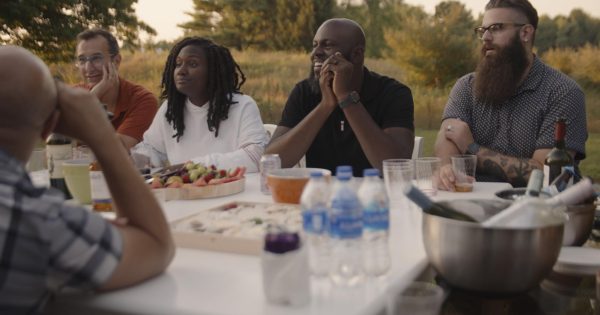If Beale Street Could Talk
As Dance Guild went on in the CFAC auditorium this past Saturday, a crowd of around 20 people sat in the CFAC recital hall, watching Ken Heffner introduce Barry Jenkins’s film “If Beale Street Could Talk” (2018).
“Art has a lot of functions and one of those functions is to take you to another world… this film gives you a gift to visit a black world,” said Heffner.
The movie begins slowly, soaring over Tish (KiKi Layne) and Alonzo “Fonny” Hunt (Stephan James) as they walk hand-in-hand next to a river. Tish turns to Fonny and says, “You ready for this?” Fonny and Tish kiss, and the camera moves in close to capture and seal the intimate moment. Then the movie cuts and we see Tish watching the handcuffed Fonny as he walks to the visitation booth.
It is not clear what Tish was referring to when she asks Fonny these lines, but this jarring cut from idyllic intimacy to terrifying reality brings us into the right into the world of “If Beale Street Could Talk,” whether or not we we are ready.
“If Beale Street Could Talk,” based on the novel of the same name by James Baldwin, is Barry Jenkins’ third feature film, his first since “Moonlight” (2016) which won the Oscar for best picture, Supporting Actor (Mahershala Ali), Best Adapted Screenplay and eight other nominations. Although “If Beale Street Could Talk” is a wholly distinct story from “Moonlight,” Jenkins creates similar tone as “Moonlight,” letting the quiet power of the images settle in.
“If Beale Street Could Talk” is told through the eyes of Tish, a young girl of about 19 who becomes pregnant with the child of her childhood friend turned lover, Fonny, who has been falsely accused of raping a woman. The story oscillates between two narratives: the happy, blissful moments between Tish and Fonny as thier romance begins, and the terrifying struggle for justice in a corrupt legal system. Tish lives in a world of fear and uncertainty, a world where her loved ones could be taken away from her unjustly. It is in this world that her child is to be born.
With Jenkins’s masterful direction, “If Beale Street Could Talk” draws the viewer into this world, makes both the intimacy and the social commentary personal.
When the movie finished, the audience applauded but then remained in their seats for a few minutes before quietly shuffling out of the recital hall. Daniel Tsui, a senior social work major, commented on the similarities between the movie’s depiction a corrupt legal system in 1970s to the legal system in 2019.
“All the stuff in [“If Beale Street Could Talk”] is still really relevant,” said Tsui, going on to compare the movie to to his own research on mass incarceration in the United States.
To those of you who wanted to watch “If Beale Street Could Talk” but were unable to this past Saturday, you can stream “If Beale Street Could Talk” on Hulu.






